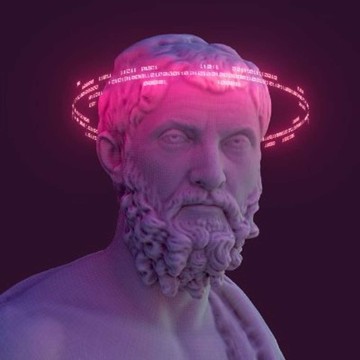

Crazy Wisdom
Stewart Alsop
In his series "Crazy Wisdom," Stewart Alsop explores cutting-edge topics, particularly in the realm of technology, such as Urbit and artificial intelligence. Alsop embarks on a quest for meaning, engaging with others to expand his own understanding of reality and that of his audience. The topics covered in "Crazy Wisdom" are diverse, ranging from emerging technologies to spirituality, philosophy, and general life experiences. Alsop's unique approach aims to make connections between seemingly unrelated subjects, tying together ideas in unconventional ways.
Episodes
Mentioned books

Apr 8, 2024 • 55min
Silicon Dreams: Rob Glaser’s Impact on the rise of personal computing
Welcome to the Crazy Wisdom podcast, where we explore the interplay of technology, society, and the mind. In this special "Stewart Squared" series, we dive into the stories and insights of pioneers who have shaped the digital world. Today, we're thrilled to feature Rob Glaser, founder and CEO of Real Networks, a trailblazer in the realm of streaming media. Join us as Stewart Alsop III and his father, Stewart Alsop II, delve into Glaser’s fascinating journey from his early days at Microsoft, revolutionizing the world of software with Microsoft Word, to launching Real Networks and navigating the tumultuous waters of the tech industry. Get ready for a conversation filled with intimate anecdotes, profound reflections on the evolution of digital media, and thoughtful perspectives on the future of technology and AI To find out what happened in the episode without listening to it, feel free to use this GPT to do so (there are system prompts you can use to do so) Timestamps: 5:00 - Early memories of interactions between Rob Glaser and Stewart Alsop, and discussions about the evolution of Microsoft Word and its competition with WordPerfect. 10:00 - Glaser's recount of his time at Microsoft, including his work on applications and the strategic moves that led to Microsoft's success in the office suite market. 15:00 - The founding of Real Networks, the emergence of streaming media, and the technological innovations and challenges faced in the early days. 20:00 - Expansion of Real Networks and its role in the streaming media industry, including partnerships and market dynamics. 25:00 - Rob Glaser's entrepreneurial journey, the evolution of Real Networks, and the impact of digital media on the business landscape. 30:00 - Discussion on the transition of Real Networks from a public to a private company and the strategic reasons behind this change. 35:00 - Conversations about the tech industry at large, the development of AI, and Glaser's perspective on technological advancements. 40:00 - Examination of generative AI, its impact on society, and the ethical and practical challenges it presents. 45:00 - Broader societal and technological issues, including the accuracy of information and the role of tech companies in public discourse. 50:00 - The influence of digital media on society, the concentration of power in large tech companies, and the balance between innovation and control. 55:00 - Concluding remarks, the ongoing relevance of Real Networks in the tech industry, and final thoughts from the participants. Key Insights Rob Glaser's Early Career and Microsoft's Evolution: Rob Glaser shared his experiences working at Microsoft from 1983 to 1993, where he played a pivotal role in reviving Microsoft Word and contributing to the company's growth. His journey offers insights into the competitive dynamics of the software industry and Microsoft's strategy in becoming a dominant player in the office applications market. Inception of Real Networks and Streaming Media: Glaser recounted the founding of Real Networks and its pioneering role in the development of streaming media technology. This insight underscores the challenges and innovations of early internet media, highlighting Real Networks' contribution to making streaming a standard form of consuming content online. Technological Challenges in the Early Days of Streaming: The discussion revealed the technical hurdles Real Networks faced in the mid-90s, such as bandwidth limitations and the nascent state of internet infrastructure. Glaser’s account of optimizing streaming for low bandwidth environments underscores the company's innovative approach to delivering audio and later video content. Shift from Public to Private Company: Glaser explained the strategic decision to take Real Networks private after years of being a public entity. This move reflects the changing dynamics and strategic pivoting required to stay relevant and competitive in the rapidly evolving tech landscape. Impact of AI and Digital Media on the Tech Industry: The conversation delved into Rob Glaser’s perspective on artificial intelligence and its implications for the future of technology. His insights into generative AI and its potential applications, as well as the ethical considerations it raises, highlight the transformative impact of AI on the tech industry and society at large. Market Dynamics and Competitive Strategies: The dialogue touched on the competitive strategies employed by Microsoft in the office suite market, illustrating how bundling products like Word and Excel helped Microsoft gain a competitive edge. This strategy led to significant shifts in market dynamics, affecting competitors like Lotus and WordPerfect. Real Networks’ Evolution and Current Focus: Glaser detailed the evolution of Real Networks, focusing on its current endeavors in AI and machine learning, particularly in the realm of security and content identification. This evolution reflects the company’s adaptation to the changing technological landscape and its efforts to remain at the forefront of innovation in digital media and security.

Apr 5, 2024 • 50min
Linux, AI, and the Open-Source Revolution: A Dialogue with Adam Cohen
In this episode, Stewart Alsop is in conversation with Adam Cohn (linkedin and twitter), the CEO of Deepin, focusing on the open-source AI project, Adios. They discuss the importance and history of open source, particularly in relation to AI, emphasizing the role of collaboration and knowledge sharing in advancing technology. Adam details his project of an open-source AI wearable device, and its implications for technology and data privacy. They also touch on the role of AI in software and coding, the definition and future of autonomous agents, and the various models of open-source AI. Timestamps 00:02 Introduction and Guest Presentation 00:54 Exploring Open Source and Its History 02:23 Understanding the Role of Linux in the Digital Age 02:59 The Intersection of Open Source and Personal Computing 04:29 Deep Dive into Linux and Unix 06:20 The Security Aspects of Open Source 08:31 Exploring the Business Model of Open Source 10:23 The Future of AI and Open Source 10:29 Discussion on Mistral and Open Source 18:29 The Importance of Open Source in Wearable Technology 22:03 Building an Open Source Wearable 25:00 Exploring the Potential of Bluetooth Technology 25:47 The Intricacies of Voice Cancellation Technology 26:17 Discussing the Hardware and Software Aspects of the Company 27:17 The Role of Open Source in Technology Development 27:30 The Challenges of Implementing Technology in Argentina 28:09 The Intersection of Hardware and Software in Product Development 28:55 The Importance of Aesthetics in Wearable Technology 29:38 The Potential Risks of Manufacturing in China 30:01 The Power of Open Source in Ensuring Transparency 30:36 Highlighting Key Figures in the Open Source AI Community 32:05 The Philosophy Behind Open Source and Its Impact on Democracy 42:20 The Future of Autonomous Agents in AI 47:18 The Role of Coding in the Age of AI Key Insights Open Source as a Foundation of Technology and Innovation: Adam Cohen stresses the importance of open source, highlighting its historical roots intertwined with the development of computing and the broader scientific revolution. Open source, by sharing knowledge, code, and documentation, has advanced the digital age, with Linux emerging as a pivotal force in the server domain, despite the commercial success of proprietary systems like Windows and MacOS. Linux's Dominance and Security in the Digital Landscape: The discussion underlines Linux's significant role in powering the internet, serving as the underlying technology for most servers. Cohen argues that Linux's open-source nature contributes to its enhanced security compared to proprietary systems, allowing for broader collaboration and scrutiny in its development. The Business Model of Open Source: Cohen dispels the myth that open source equates to non-profitability, explaining how companies can thrive by adopting an open core model. This approach allows for the core product to be open-source, with monetization coming from additional services or managed solutions, as seen with GitLab and Redis. Open Source in AI and the Debate Around Accessibility: The conversation shifts to the complexities of open-source AI, touching on Mistral's approach of releasing some models openly while reserving others for commercial use. Cohen expresses support for a model where older versions become open source as new iterations are developed, fostering a balance between innovation and accessibility. The Personal AI Wearable Project: Adam Cohen introduces his project of developing an open-source, AI-powered wearable device. He emphasizes the importance of user control over data, foreseeing a future where personal AI devices, intimately integrated into our lives, require transparent and user-driven data management to prevent potential misuse. The Implications of Closed-Source Wearables: Cohen raises concerns about the potential dangers of closed-source wearables, which could lead to invasive data collection and privacy breaches. His advocacy for open-source development in this domain is rooted in the belief that users should have absolute control and understanding of how their data is used and stored. The Role of Community and Ethics in Open Source: The discussion concludes with a broader reflection on the ethos of the open-source community. Cohen argues that open source is not just about technology development but also about fostering a democratic, inclusive, and ethical approach to innovation, ensuring that advancements are made transparently and with community input to avoid the pitfalls of centralized control and potential misuse of technology.

Apr 1, 2024 • 49min
Digital Dollars and Cowboy Values: The Wyoming Stable Token Story
In this episode of the Crazy Wisdom Podcast, Stewart Alsop sits down with David Pope, CPA, CGMA, and Commissioner of the Wyoming Stable Token Commission. They delve into the innovative financial landscape of Wyoming, particularly focusing on the development and implications of stable tokens. The conversation covers the legislative journey, economic strategies, and the broader vision of integrating digital assets into Wyoming’s financial ecosystem. Additionally, they explore philosophical aspects of leadership, partnership dynamics, and the profound connection between humans and animals, drawing parallels between management theories and equine psychology. Timestamps 00:05:00 - Discussion on the use and impact of stable coins, including personal experiences. 00:10:00 - Wyoming's approach to creating its own stable token and potential federal government response. 00:15:00 - Wyoming's history of pioneering legal frameworks for digital assets and the concept of Speedy Banks. 00:20:00 - Future possibilities with Wyoming's stable token and its benefits for state funding and services. 00:25:00 - Transition to discussing human and animal relations, specifically horses, and their behavior. 00:30:00 - Philosophical discussion on human nature and leadership. 00:35:00 - Exploring the dynamics of business partnerships and individual entrepreneurial journeys. 00:40:00 - Continuation on partnership management and the development of businesses over time. 00:45:00 - Reflections on California and its comparison with Wyoming, personal and economic freedoms. Key Insights: Innovative Financial Legislation in Wyoming: David Pope elaborates on Wyoming's progressive stance in financial technology, particularly highlighting the Wyoming Stable Token Act. This legislation allows the state to create its own stable token, aiming to facilitate faster international transactions and settlements. Wyoming’s approach signifies a pioneering move to leverage blockchain technology for enhancing financial infrastructure and operational efficiency. Stable Token as an Economic Tool: The conversation sheds light on how the Wyoming stable token is designed to be backed by tangible assets like cash or U.S. Treasuries, ensuring stability and reliability. This mechanism not only aids in maintaining the token’s value but also generates investment returns that contribute to the state’s economic growth, including funding for schools and infrastructure. Strategic Approach to Cryptocurrency and Regulation: David Pope discusses the balance between innovation and regulation in the cryptocurrency domain. Wyoming’s strategic approach aims to provide a robust framework for stable tokens, ensuring they remain pegged and reliable amidst market fluctuations. This initiative reflects a broader vision of creating a stable and trustworthy digital currency landscape. Leadership and Management Insights: The conversation delves into leadership and human dynamics, drawing parallels between managing horses and leading people. Understanding motivation and establishing trust are highlighted as fundamental aspects of effective leadership and management. These insights underline the importance of empathy, awareness, and adaptability in fostering productive relationships and environments. Business Partnerships and Growth: The discussion on partnerships reveals the complexity and importance of aligning goals, motivations, and efforts in business relationships. David Pope emphasizes the significance of careful selection and alignment in partnerships to ensure mutual growth and success. This perspective is crucial for entrepreneurs and business leaders navigating the intricacies of collaboration and shared ventures. Economic and Cultural Reflections on California and Wyoming: Stewart and David reflect on the economic, cultural, and lifestyle contrasts between California and Wyoming. While discussing the allure and challenges of living in California, the dialogue appreciates Wyoming’s unique position in offering a blend of natural beauty, economic opportunities, and innovative legislative environment, portraying it as an attractive alternative for businesses and individuals seeking growth and stability. Philosophical and Ethical Considerations: The episode touches on philosophical and ethical questions related to technology, governance, and human-animal relationships. The discussion explores how technological advancements, particularly in the financial sector, intersect with ethical considerations, privacy, and the broader societal impact. These reflections offer a deeper understanding of the responsibilities and implications associated with innovation and policy-making in the modern world.

Mar 25, 2024 • 45min
Beyond Silicon: Trent (CEO of Holium) on AI's Corporate Revolution
The podcast features a discussion on AI's potential impact on corporate culture and decision-making. Topics include AI replacing market functions, large language models synthesizing human knowledge, information velocity, coordination in life, technological developments on society, decentralization in AI, and balancing technological acceleration with resilience.

Mar 22, 2024 • 52min
The Generative Art Revolution: Jonas Lamis on the Intersection of AI and Creativity
In this episode of the Crazy Wisdom podcast, Stewart Alsop interviews Jonas Lamis about his journey from early computer programming to becoming a partner at Medicaid and a notable collector of JPEGs and NFTs. Lamis shares stories about his father's transition from physical to computer art in the 1980s, detailing the influence it had on his own interests in digital art and collectibles. The conversation also explores Lamis’ involvement with NFTs through Ethereum and Flamingo DAO, highlighting the evolution of digital art from generative projects like CryptoPunks and ArtBlocks to emerging AI art. Lamis unveils his work on digital 3D assets and the future of digital ownership, emphasizing the significance of blockchain technology in ensuring self-sovereign digital experiences. Lastly, Lamis introduces StoryBank, an AI-driven project aimed at preserving personal memories and stories, suggesting the potential for creating a digital twin as a form of digital immortality. The discussion also touches on the technical aspects of integrating digital collectibles with real-world items and the transformative potential of generative AI in various domains. Timestamps 00:07 Exploring Jonas Lamis' Fascination with NFTs and His Father's Artistic Legacy 02:56 The Evolution of Personal Computing: A Nostalgic Journey 05:45 Diving Deep into the World of NFTs and Crypto 10:29 The Impact of AI on Art and the Future of Digital Creation 22:01 The Future of NFTs, Gaming, and 3D Digital Worlds 28:20 Exploring the Intersection of Blockchain, Fashion, and Digital Identity 43:40 StoryBank: Preserving Personal Histories Through AI 49:08 Envisioning Digital Immortality and the Future of AI Key Insights Legacy of Art and Technology Intersection: Jonas Lamis shared the story of his father, a noted artist who transitioned from physical sculptures to computer-generated art in the early 1980s. This narrative highlights the profound impact of technology on art, demonstrating how the advent of computers with graphic capabilities inspired traditional artists to explore new forms of digital expression. This early blend of art and technology in Lamis's family background laid the foundation for his interest in digital art and NFTs, illustrating the generational influence of technological innovation on artistic practice. Evolution of Computing and Programming: Jonas recounted his early experiences with computing, specifically with the IBM PC Junior, and learning to program in BASIC without the resources like the internet or YouTube, relying instead on programming manuals and magazines. This insight provides a glimpse into the nascent days of personal computing, where learning to code was a more manual and discovery-based endeavor, emphasizing the significant advancements in accessibility and resources for learning technology over the years. The Rise of NFTs and Crypto Art: Jonas Lamis's journey into the world of NFTs began with his exposure to the cryptocurrency scene in San Francisco around 2013-2014 and eventually led to his active participation in the NFT market, particularly with Flamingo DAO. This trajectory showcases the evolution of NFTs from a niche interest to a significant cultural and economic phenomenon within the art and technology communities, highlighting the growing appreciation and market for digital art. Community and Innovation in Digital Art: The conversation touched on the importance of community in the NFT and digital art space, as exemplified by Lamis's involvement with Flamingo DAO. This insight stresses the role of communal efforts in curating, collecting, and valuing digital art, pointing to the collaborative nature of the digital art ecosystem and how it fosters innovation and discovery in the art world. Impact of AI on Art and Creativity: Lamis discussed the transformative effect of AI on the art world, particularly through AI-generated art and its integration into platforms like Flamingo DAO. This reflection highlights the ongoing revolution in creativity and artistic production, where AI tools are not only creating new art forms but also challenging traditional notions of authorship and artistic value. Digital Legacy and Personal History: Jonas Lamis's project, StoryBank, was inspired by the desire to capture and preserve personal histories through AI, sparked by the loss of his mother and the realization of the unrecorded stories. This insight underscores the growing significance of digital legacy and the potential of AI to capture and immortalize personal narratives, reflecting broader themes of memory, history, and the human desire to be remembered. The Future of Digital Identity and Immortality: The discussion ventured into the concept of digital twins and the potential for digital versions of individuals to exist independently, serving as repositories of personal memories and experiences. This idea opens up philosophical and ethical considerations about identity, consciousness, and the nature of existence in a digital age, suggesting a future where the boundaries between the physical and digital selves become increasingly blurred, and digital immortality becomes a tangible possibility.

Mar 18, 2024 • 1h 5min
Synaptic Journeys: Unraveling AI with Anand Dwivedi
In this episode of the Crazy Wisdom Podcast, Stewart Alsop engages with senior data scientist Anand Divedi to delve deep into the facets of machine learning and AI’s evolving capabilities. They discuss Anand's journey and insights into AI, particularly focusing on the freedom from execution boundaries brought by advancements in AI and large language models (LLMs). The conversation extends to the concept of 'human in the loop' learning, emphasizing the interdisciplinary approach to mimicking neural decision-making processes. Anand shares his initial foray into machine learning via financial surveillance to detect fraud utilizing AI to sift through massive data. They discuss the significance of teaching and learning for both AI models and humans, touching on aspects of cognitive pruning, memory, and how AI, much like the human brain, can 'forget' outdated information to make room for new learnings. The episode also introduces Haley Darden, who kicks off her segment on supervised learning, aiming to bridge the gap between technical AI concepts and everyday understanding. Together, they ponder over the future of AI in terms of model specialization versus generalization, and whether AI should or can forget information similar to human cognitive pruning. Check out this GPT we trained on this conversation Timestamps 00:41 Diving Deep with Anand Divedi: Exploring Machine Learning and Boundaries 01:23 The Evolution of Machine Learning: From Boundaries to Freedom 04:00 Bridging the Gap: Machine Learning for Technical and Non-Technical Minds 08:54 Human in the Loop: Merging AI with Human Decision-Making 10:20 From Financial Surveillance to AI: Anand's Journey into Machine Learning 14:13 Understanding AI: Parameters, Learning, and Growth 29:54 The Spiritual and Philosophical Dimensions of Learning and AI 37:28 Exploring Self-Reflection and Emotional Learning 38:12 The Role of Memory and Reflection in Learning 38:47 Introducing AI's Long-Term Memory and Reflection 39:10 Active Learning and the Structure of Self in AI 40:42 Welcoming Haley Darden and Discussing Supervised Learning 41:44 Breaking Down AI: From Basics to Complex Concepts 44:56 Understanding AI's Learning, Forgetting, and Trust Mechanisms 59:01 Concluding Thoughts and Future Directions Key Insights Breaking Boundaries in AI and Machine Learning: Anand Dwivedi shared a significant shift in his approach to AI, where he moved from conceptual boundaries to practical execution, experiencing a newfound sense of freedom. This reflects a broader trend in the AI field, where advancements in large language models (LLMs) and other technologies have drastically expanded the possibilities for innovation and application, enabling researchers and practitioners to explore new frontiers beyond traditional limitations. Human-in-the-Loop Learning: The conversation highlighted Anand's work in human-in-the-loop learning, emphasizing the integration of human decision-making processes within AI systems. This approach seeks to understand and replicate human reasoning in AI models, facilitating a symbiotic relationship where both humans and AI contribute to and enhance the learning process, thereby improving the accuracy and effectiveness of AI applications in real-world scenarios. The Evolution of AI through Large Language Models: Anand discussed the transformative impact of LLMs on his work, describing them as powerful tools for parsing and analyzing information. These models have revolutionized how AI can assist in structuring thoughts and accelerating research processes, showcasing the rapid development in AI's capabilities and the increasing sophistication of tools available to data scientists and researchers. The Importance of Frameworks in AI Learning: Throughout the podcast, the significance of frameworks in understanding and implementing AI was a recurring theme. Anand underscored the need for structured approaches to learning and applying AI, highlighting how frameworks can guide users in effectively leveraging AI capabilities, thus bridging the gap between technical complexity and practical usability. AI's Impact on Decision Making and Surveillance: Anand's insights into his career, particularly in financial surveillance, illustrated how AI can be pivotal in managing vast amounts of data to identify anomalies or fraudulent activities. This underscores AI's role in enhancing the efficiency and accuracy of decision-making processes in high-stakes environments, such as financial markets, where the ability to swiftly analyze and act on data is crucial. Neuroscience and AI: The discussion touched on the intersection of neuroscience and AI, with Anand exploring how AI models mimic neural processes. This comparison not only sheds light on the potential of AI to replicate human cognitive functions but also on the ongoing efforts to improve AI's learning and decision-making capabilities by understanding and emulating the complexities of the human brain. Future of AI and Ethical Considerations: The conversation ventured into the future trajectory of AI, including the ethical dimensions of AI development and application. Anand's dialogue with Hayley Darden in the latter part of the episode highlighted the challenges in ensuring AI's reliability and trustworthiness, addressing concerns such as AI hallucinations and the importance of developing robust mechanisms to evaluate and trust AI outputs, thereby ensuring AI's responsible and ethical integration into society.

Mar 12, 2024 • 55min
Creativity Unchained: Merging Ideas with Evan Brown
In this episode of the Crazy Wisdom podcast, Stewart Alsop interviews Evan Brown, a multi-faceted talent with experiences as a copywriter, concept developer, author, and musician. The conversation explores the nature and sources of creativity, especially in relation to leveraging AI in creative practices. Brown shares insights into his own creative processes across different mediums and discusses the potential impact of AI on creativity and the advertising industry. They touch on the importance of originality in creative work and the potential pitfalls of devaluing creativity by labeling everything as 'content'. The discussion also veers into ethical considerations in using AI, the changing landscapes of art and advertising, and the evolving notion of success in fragmented cultural contexts. Brown shares his personal journey and experiences living in and drawing inspiration from different cities, underscoring the importance of embracing unfamiliarity for creative growth. Check out this GPT we trained on the conversation Timestamps 00:15 Exploring Creativity in the Age of AI 00:49 The Essence and Source of Creativity 03:14 AI's Impact on Creativity and the Future 04:31 Skepticism and the Future of AI in Creativity 05:37 The Uncanny Valley and AI's Limitations 13:17 AI in Advertising: Current Uses and Ethical Considerations 20:08 The Creative Process in Advertising Before AI 25:44 The Resilience and Creativity in Advertising 27:07 Navigating the Fine Line: Protecting Creative Work 29:57 The Essence of Creativity and Its Challenges 30:34 Artistry Beyond the Canvas: Creativity in Various Disciplines 34:21 The Impact of AI on Creative Industries and Society 36:45 Exploring the Fragmentation of Culture and Media 48:42 The Unique Charm of Montreal and Other Cities 52:37 Concluding Thoughts and Future Projects Key Insights Integration of Disparate Ideas: Evan Brown underscores that creativity thrives on the amalgamation of diverse thoughts and perspectives, forming unique and novel ideas. This process is central to pushing the boundaries of what is considered conventional, fostering innovation and evolution in various creative fields. Valuing Creativity Beyond "Content": The dialogue highlights concerns about the reduction of creative works to mere "content." This term can diminish the perceived value and depth of creative efforts, underscoring the need for a vocabulary that reflects the richness and complexity of creative work. AI's Dual-Edged Impact on Creativity: While AI introduces new tools and possibilities for creative expression, it also presents challenges, including ethical dilemmas and the potential homogenization of creative outputs. The conversation urges a thoughtful examination of how AI is integrated into the creative process. The Critical Role of Ethics in AI Development: Ethical considerations are highlighted as fundamental in guiding the development and application of AI within creative industries. This ensures that technological advancements enhance rather than undermine human creativity and cultural diversity. The Evolution of Advertising Practices: The episode discusses how advertising practices are being transformed by AI technologies. This includes both the opportunities for more targeted and personalized campaigns and the challenges of navigating a rapidly changing digital landscape. Importance of Diverse Perspectives: Diversity in thought and background is celebrated as a key driver of creativity and innovation. The inclusion of varied viewpoints enriches the creative process, leading to more impactful and resonant work. Balancing AI Advancements with Human Creativity: The dialogue concludes with a call to find a balance between leveraging AI's capabilities and preserving the intrinsic value of human creativity. This balance is crucial for ensuring that technological advancements support rather than supplant the creative contributions of individuals.

Mar 8, 2024 • 54min
Redefining Clouds: AI's Leap into Decentralization
In this episode of the Crazy Wisdom Podcast, Stewart Alsop interviews Michelle Shocron, CEO and founder of Parsed, diving deep into the evolving landscape of artificial intelligence, cloud computing, and the shift towards GPU-based computing for AI applications. They discuss how cloud services like AWS and Google Workspace are pivoting towards AI, leveraging models for various functions including storage and computation. Michelle shares insights about the increasing attraction of AI software as investments and AI-driven opportunities in cloud computing. The dialogue also explores the concept of decentralized computing and the potential for AI to operate independently, laying the groundwork for a world where AI can run locally on individual devices, reducing reliance on centralized services. They speculate on the future of AI technology's integration into social media and the internet, addressing the challenges of distinguishing real from fake content, and the implications for human interaction and information consumption. Lastly, Michelle introduces Parsed, detailing its mission to democratize AI accessibility and usage among businesses by overcoming the barrier of asking the right questions and optimizing AI application through a user-friendly platform. Check out the GPT we trained on the convo Timestamps 00:54 Exploring the Intersection of AI and Cloud Computing 05:26 The Future of AI: Decentralization and Local Models 10:59 The Impact of AI on Social Media and Internet Usage 19:49 The Role of AI in Cybersecurity and Truth Detection 25:30 The Shift in Work-Life Balance and Entrepreneurship in the AI Era 27:40 The Impact of AI on Consumer Interaction 28:03 The Responsibility and Uncertainty of AI in Business 28:25 The Role of AI in Credit Systems and Predictive Models 29:22 The Adoption and Branding of AI 31:26 The Challenges and Potential of AI Chatbots 33:37 The Unpredictability and Control of AI 34:20 The Future of AI: Explainable AI and Access 37:15 The Role of Open Source and Decentralization in AI 42:50 The Power Dynamics in AI and Society 45:11 The Journey of Building an AI Startup 48:57 The Importance of Asking Better Questions in AI 52:17 Conclusion: The Future of AI and How to Thrive Key Insights Decentralization of AI and Technology: There's a significant emphasis on how decentralization, driven by blockchain technologies, can offer an alternative to the current model dominated by private corporations and venture capital. This shift towards open-source development is seen as a potential future that challenges the status quo, highlighting the importance of incentives in promoting open-source projects. AI's Impact on Cloud Computing: The conversation touches on the evolving relationship between AI and cloud computing, suggesting that AI could significantly shift the landscape of cloud computing. This includes the potential for AI to become more attractive for investments and the way AI technologies are becoming central to companies traditionally focused on cloud services. Creative and Efficient AI Applications: The dialogue explores how AI, particularly in the form of chatbots and AI-driven models, can be tailored for specific niches like education, customer service, and private equity, suggesting a future where AI's versatility leads to more personalized and efficient applications. The Paradox of Choice and AI Adoption: Michelle discusses how one of the main challenges in AI adoption is the paradox of choice, where too many options lead to decision paralysis. Her startup aims to resolve this by helping companies develop an AI mindset and improve workforce productivity by simplifying choices and fostering creativity. Social Media and AI: There's an exploration of how AI is already deeply integrated into social media, affecting user experiences and behaviors. This includes discussions on how people interact with AI unknowingly through algorithms and the potential for AI to change content creation and consumption. Ethical and Societal Implications of AI: The conversation delves into broader philosophical questions about power, visibility, and the role of AI in society. This includes discussions on the nature of power, the potential for AI to redefine social structures, and the ethical responsibilities of AI developers. Future of AI Development: The discussion hints at the ongoing evolution of AI, including the shift towards more localized, decentralized AI models that could run independently of the internet, potentially changing how we interact with technology on a fundamental level. Overcoming the "Blank Page" Phenomenon: The idea that AI, specifically tools like ChatGPT, can help overcome the initial hurdle of starting a project or idea by providing prompts and suggestions, essentially serving as a catalyst for creativity. AI and the Job Market: Insights into how the rise of AI might change job landscapes, emphasizing the importance of adapting to and learning about AI to remain relevant in future job markets. Decentralized Entrepreneurship: The discussion points towards a trend of decentralized entrepreneurship, where individuals leverage digital platforms and AI to create new business models and revenue streams, challenging traditional employment and business practices.

Mar 4, 2024 • 48min
From Silicon Dreams to AI Realities: Navigating Tech's Next Frontier
The podcast episode features a conversation between Stewart Alsop III and his father, Stewart Alsop II, and their guest, Joe Schoendorf from Accel, a prominent venture capital firm. Joe shares his insights on the transition from the early PC computing industry to the rise of the internet and eventually to the AI revolution. They discuss factors like the creation of the cloud, AI, and other technological tools that have greatly accelerated the speed of innovation. The podcast also covers the history of Silicon Valley, the evolution of venture capital, and the roles of today's young CEOs in tech startups. Stories recalling specific incidents from Silicon Valley's history and influential personalities, like Mark Zuckerberg, are also shared. Timestamps 02:04 The Start of the Interview with Joe Schoendorf 02:40 The Journey into Venture Capitalism 04:04 The Story of Joe Schoendorf and Apple 05:28 The Evolution of the Computer Industry 11:07 The Transition from Instruments to Computers: Hewlett Packard 17:17 The Rise and Fall of Tech Giants 21:23 The Emergence of AI and the Future of Tech 26:17 Recognizing Patterns in Business 27:02 The Origin of Silicon Valley 27:10 The Story of William Shockley 32:14 The Impact of the Consciousness Revolution on the Computer Industry 35:06 The Evolution of Silicon Valley and the Role of AI 40:34 The Journey to Accel and the Facebook Investment Key Insights The Evolution of Silicon Valley and Venture Capital: The episode highlighted the historical context of Silicon Valley's evolution, emphasizing the shift from hardware and instruments to software and the internet. Joe Schoendorf shared anecdotes from his career to illustrate this transition, including his experiences with companies like HP and Apple. This reflects the broader trend of technological innovation driving economic and cultural shifts, underscoring the importance of adaptability and foresight in the tech industry. The Probabilistic Nature of AI Compared to Deterministic Computing: One of the central discussions revolved around the difference between traditional computing and AI. The past 50 years of computing were deterministic, where outcomes are predictable and repeatable. In contrast, AI is probabilistic, offering a different approach to problem-solving and innovation. This distinction underscores AI's potential to enhance personal agency through technology, promising a future where technology adapts to and learns from human behavior. The Importance of Young Talent in Shaping Technology's Future: Schoendorf pointed out that the key to predicting the future of technology lies in understanding where smart, young people choose to work. Unlike 20 years ago, when the aspiration was to work for established tech giants, today's talent is more inclined towards startups, especially in AI. This shift indicates a potential for significant disruption and the emergence of new leaders in the tech industry, as was seen in the transition from mainframes to personal computers and now to AI. The Role of the Cloud in Enabling AI: The conversation highlighted the cloud's pivotal role in AI's development. By providing a centralized repository of digital information that can be efficiently retrieved and processed, the cloud has made it possible to train AI systems in ways that were previously unattainable. This has led to rapid advancements in AI technology and its applications, signaling a new era of innovation driven by data accessibility and computational power. The Cyclical Nature of Technological Disruption and Leadership: Schoendorf reflected on the historical pattern where incumbents rarely survive major platform shifts, citing examples from the transitions from mainframes to minicomputers, and then to personal computers and the internet. This pattern suggests that the current AI revolution will likely give rise to new industry leaders, emphasizing the importance of innovation and adaptability in maintaining competitive advantage.

Mar 1, 2024 • 1h 2min
Identity in the Age of Artificial Intelligence: A Journey Within
A nuclear engineer turned philosopher discusses transitioning to machine learning, the future of AI, and the importance of ethics in innovation. They explore identity, consciousness, and the impact of disruptive technologies on the job market.


